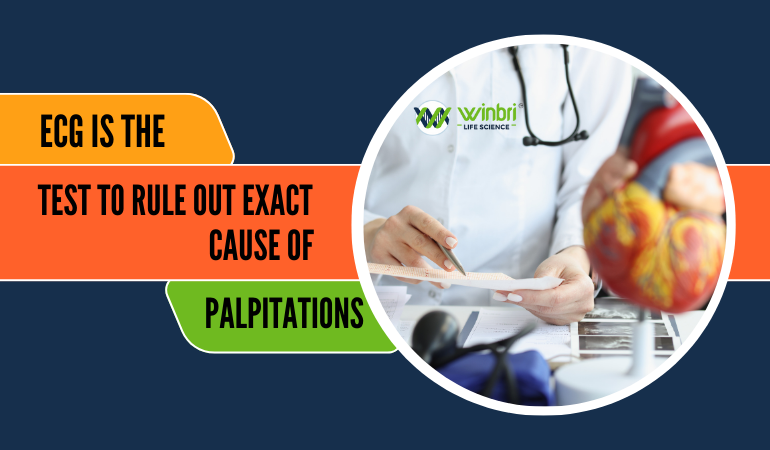The feeling of a pounding, fluttering, inadequately beating heart is called heart palpitation. Heart palpitations don’t come under the most serious of heart problems as they can also be caused by work anxiety, unnecessary stress, physical exercise, various medical conditions, etc. This disease can cause instant worry in the mind of the patient but is usually harmless. Heart arrhythmia is the condition of a heart that beats irregularly.
Electrical signals in the heart are responsible for the proper functioning of the heart as they coordinate heartbeats. When the working of electrical signals in the heart is damaged or isn’t going as it should, it leads to heart rhythm problems, that is, heart arrhythmia. A heart rate that is defined as ‘beating too fast’ is known as Tachycardia and the one as ‘beating too slow’ is called Bradycardia. As heart arrhythmias also feel like fluttering or racing heart, they are often considered heart palpitations. Heart palpitations are a form of heart arrhythmia, the less serious one. In other words, heart palpitations can be termed minor heart arrhythmia. It’s not uncommon for people to normally have a slow or fast-beating heart sometimes, thus making heart palpitations generally harmless. But some particular types of heart arrhythmias are dangerous and can even turn fatal. Heart arrhythmias are categorized as:
A Fast Heartbeat: Tachycardia. A resting heart suffering through Tachycardia beats more than 100 times in a minute.
A Slow Heartbeat: Bradycardia. A resting heart suffering through Bradycardia beats less than 60 times in a minute.
Arrhythmias very commonly cause palpitations as the irregular rhythm of a heart can give a sensation of pounding or fluttering in the heart. Symptoms of heart palpitations include skipping beats, flip-flopping, fluttering rapidly, etc.
Following are the symptoms of heart arrhythmias:
- Anxiety and fatigue
- Light-headedness
- Chest pain
- Shortness of breath or dyspnoea
- A slow heart or a racing heart
Causes of Heart Palpitations
A healthy heart is one that beats between 60 to 100 times in a minute. The rhythm of the heart is in the hands of a naturally existing pacemaker that is called ‘the sinus node’ in the upper right chamber of the heart (that is known as the atrium). The electrical signals that are produced by the heart is transported by the sinus node to start every heartbeat. The electrical signals are required to travel through the chambers of the heart for the heart muscles to function properly and for the heart to pump blood adequately. The signalling process of the heart, undertaken by it to pump blood, is smooth when the heart is beating more than 60 times a minute and less than 100 times a minute. When this process is disrupted and the heart begins to beat in an irregular manner, the functioning of the heart gets improper, resulting in heart palpitations, or even heart arrhythmias if the situation isn’t attended to.
What all can cause heart palpitations, which can turn into the condition of heart arrhythmias if not taken care of, include:
Heart attack (or scars from previous heart attacks): The most common thing that can cause heart palpitation and can give a feeling of fluttering or pounding heart is a heart attack. A heart attack is a medical emergency that takes place when the heart muscle doesn’t receive enough blood supply. Oxygen-rich blood is needed by the heart for it to work properly and when the flow of blood is disrupted in one or more than one part of the heart, it can lead to heart attack, or ultimately heart failure. The main cause of heart attack, which is coronary artery disease, is a result of the formation of plaque (Cholesterol, bad fats, waste materials, etc.) on the walls of the arteries that are responsible for the flow of blood. Heart palpitations can occur during a heart attack or can be one of the complications of suffering through a heart attack.
High blood pressure levels, high cholesterol, and diabetes can cause heart palpitations and heart arrhythmias
- Sleep apnoea, anxiety
- Certain medications and medical conditions
- High levels of caffeine or alcohol in the body
- Drug abuse, smoking
Diagnostic Test
To diagnose heart palpitations, various tests can be done, including electrocardiogram, echocardiogram, Holter monitoring, event recording, etc. One of the most common yet important tests for diagnosing heart palpitations as well as heart arrhythmias is ECG. An electrocardiogram is a test that measures the electrical signals given out by the heart on a graph to observe the voltage in reference to the heartbeat. The structure and rhythm of the heart is important to notice in order to diagnose heart palpitations. The sensors attached to the skin, along with the electrodes, are helpful to detect the electrical signals that are produced by the heart every time it beats. This test is necessary to diagnose all types of heart conditions including the sensation of a fluttering or pounding heart.
At Winbri life sciences is available for Doorstep ECG services at affordable rates, with the best of consultation and guidance provided by experts.




Leave A Comment
You must be <a href="https://www.winbri.com/wp-login.php?redirect_to=https%3A%2F%2Fwww.winbri.com%2F2024%2F01%2F24%2Fecg-is-the-only-test-to-rule-out-exact-cause-of-palpitations%2F">logged in</a> to post a comment.